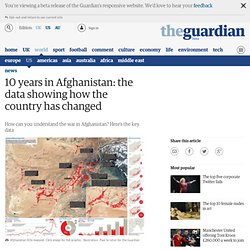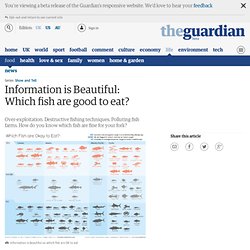

International - SPIEGEL ONLINE - News. Google. News Archive Search. War in Afghanistan: all the data you need to understand the conflict. Afghanistan has changed in many and complex ways in the 10 years since operation enduring freedom began.

In this time we have had insights into the reality of war quite unlike any before. The Afghanistan war logs gave insights into the numbers of explosive devises and the deaths these have caused. Freedom of Information requests have revealed the details of Afghanistan civilian deaths. We have even seen the compensation Afghan civilians have received from the MoD. The Guardian has created interactive map displays of the region, using the wikileaks Afghanistan war log data. There are also interactive guides to the people affected by the conflict, and their insider views. Data journalism and data visualization. Information is Beautiful: Which fish are good to eat? Visualised. In an age of over-fishing and crashing marine stocks, it's difficult to keep track of which fish are ethically kosher.

Here I've pooled and visualized the latest consensus and data from the Marine Conservation Society (PDF), Greenpeace and the SeaFood Watch. Check the data for yourself here: As ever, it's a pretty grim picture. Although there is some good news. Mussels, clams and oysters are all good to eat. More You can buy an instantly downloadable hi-res PDF of this image for £1.50 ($2.50) from here. Download a pocket-sized cut-out-and-reference list from my site. Credits Design: David McCandless & Derek GuoResearch: Miriam QuickData: About me I run InformationIsBeautiful.net, dedicated to visualising information, ideas, stories and data. More open data Data journalism and data visualisations from the Guardian World government data • Search the world's government data with our gateway. Military Forum. BBC exposes the inefficacy of the ‘morning-after’ pill. Where’s the uproar? Funny, isn’t it?

The BBC screens a documentary about ‘assisted suicide’ in which a man is shown drinking poison and dying on a comfy Dignitas sofa in snowy Switzerland, and most of the Church unites with the right-wing press in a furore of condemnation. The left-leaning media are largely content that another taboo has been broken, advocating that ‘assisted suicide’ is a bit like abortion and should be available to anyone over the age of consent. Yet when the BBC screens a documentary about the inefficacy of the ‘morning-after’ pill, in which scientific evidence establishes that its widespread availability is actually exacerbating the problem of teenage pregnancy, there is silence from both the right and the left. And the Church. The programme was ‘Week In Week Out’ (still available on iPlayer). The ‘morning-after’ pill acts to disrupt ovulation or fertilisation to prevent pregnancy.
Pharmacists are concerned with the single issue of dispensing one pill. The request was declined. Right. USA-UK : Discrepancies between official accounts of the Libyan war [Voltaire Network] The US Congressional Research Services and the UK’s House of Commons have published separately a summary paper on the first military operations in Libya.
![USA-UK : Discrepancies between official accounts of the Libyan war [Voltaire Network]](http://cdn.pearltrees.com/s/pic/th/discrepancies-official-40661286)
The thrust lies in their comparison: whereas the historical background is the same, their account of the facts differs. The US document remains vague when it comes to the chain of command, while the British document is more explicit as regards US dominance. Operation Odyssey Dawn (Libya): Background and Issues for Congress, under guidance by Jeremiah Gertler, Congressional Research Service, 28 march 2011 (33 pp., 820 Ko). 'Sunday Herald names footballer accused on Twitter' diff viewer (1/2) - News Sniffer. Web proves an unlikely saviour for investigative journalism - Online, Media. But a handful of online services are attempting to demonstrate that our impatience with the written word has been overstated and our appetite for long-form journalism is still healthy.

Byliner, the most recent, has just published its first digital offering, the 70-page Three Cups Of Deceit, an investigation by Jon Krakauer into Nobel Prize nominee Greg Mortenson's alleged misuse of donations and fabrication in his memoirs. A reported 50,000 downloads in the three days reveals a surprising enthusiasm for investigative journalism. A similar service, The Atavist, will soon release its fourth title and has a number of award-winning writers signed up for further publications. With a multimedia approach that offers audiobooks, videos, soundtracks and maps alongside the writing, The Atavist sells each non-fiction story for $2.99 via its app, splitting the revenue 50-50 with the writer.
Byliner. The Atavist - Exploring Infiniate Possibilities. Longreads: The best long-form stories on the web.